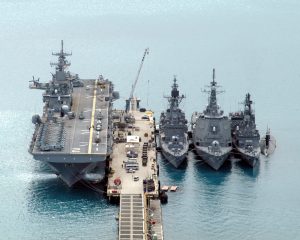 Bad behavior by U.S. Navy sailors in Japan has led to all 19,000 personnel assigned to U.S. Navy bases in Japan being banned from drinking alcohol and restricted to their base for the foreseeable future. According to a statement released by the Navy’s 7th Fleet and U.S. Naval Forces Japan on Monday, “Effective immediately, sailors are prohibited from drinking alcohol, on and off base. Additionally, all off-base liberty will be curtailed.” Family members, civilian personnel and members of other services are not covered by the order, but Navy officials are encouraging their participation.
Bad behavior by U.S. Navy sailors in Japan has led to all 19,000 personnel assigned to U.S. Navy bases in Japan being banned from drinking alcohol and restricted to their base for the foreseeable future. According to a statement released by the Navy’s 7th Fleet and U.S. Naval Forces Japan on Monday, “Effective immediately, sailors are prohibited from drinking alcohol, on and off base. Additionally, all off-base liberty will be curtailed.” Family members, civilian personnel and members of other services are not covered by the order, but Navy officials are encouraging their participation.
The order comes after several high profile incidents have harmed U.S.-Japan relations. In the latest incident, a U.S. Navy petty officer identified as Petty Officer Second Class Aimee Mejia, 21, was arrested on drunken-driving charges after striking two other vehicles. Officials said her car crossed the centerline of a busy highway shortly before midnight on Saturday, injuring a 35-year-old woman and a 30-year-old man in the other cars in a head-on crash. Japanese police found she had a blood-alcohol level six times Japan’s legal limit.
In May, Kenneth Franklin Shinzato, a civilian contractor at a U.S. base in Okinawa and former Marine, was arrested in connection with the brutal rape and murder of a 20-year-old Japanese woman. Her body was found stuffed in a suitcase and dumped in a wooded area. Mr. Shinzato has not been formally charged.
The recent arrests have generated headlines and condemnation across Japan. On the southern island of Okinawa, public anger has run high over crimes by US military personnel. Japan’s national government intends to send 100 additional police officers and 20 new patrol cars to the island by early next year specifically to deal with base-related crime.
The Navy said that the restriction would remain in effect until “face-to-face” training had taken place between all unit commanders and their sailors so that “all personnel understand the impact of responsible behavior on the U.S.-Japan Alliance and the United States’ ability to provide security and stability in the Indo-Asia-Pacific.” There are four major U.S. Navy bases in Japan, including Atsugi Naval Air Facility, Okinawa Naval Base, Sasebo Naval Base and Yokosuka Naval Base.
